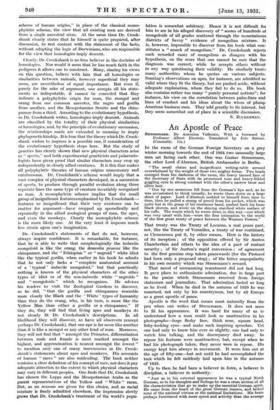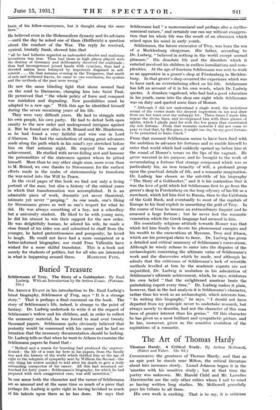An Apostle of Peace
Stresemann. By Antonina Vallentin. With a foreword by Professor Albert Einstein. Translated by Eric Sutton. (Constable. 15s.)
IN the room of the German Foreign Secretary on a grey winter morning towards the end of 1924 two unusually large men sat facing each other. One was Gustav Stresemann, the other Lord d'Abernon, British Ambassador in Berlin.
" The small chairs and insignificant writing-table seemed overwhelmed by the weight of those two mighty forms. Two heads emerged from the darkness of the room, the heavy tanned face of the Secretary of State with its prominent nose and heavy-lidded goggling eyes in strong contrast with the other's narrow brow and silver hair.
" One by one sentences fell from the German's lips and, as he was accustomed to think visually, he wrote them down on a large sheet of paper. Lord d'Abernon nodded to himself from time to time, then he pulled a stump of pencil from his pocket, which was quite lost in the grasp of his enormous hand, pushed back his loose black sleeves, and wrote on the shining starched white surface of his cuffs. The words which he wrote down in this way—one which was very usual with him—were the first intimation to the world of the first great treaty of peace between the Western Powers."
That treaty was the Treaty of Locarno, a real peace pact, not, like the Treaty of Versailles, a treaty of war continued, as Clemenceau put it, by other means. Here is the history of its inception ; of the opposition offered by Sir Austen Chamberlain and others to the idea of a pact of mutual security ; of Sir Austen's rapid conversion ; of agreement to the first genuine step taken peacewards (for the Protocol had been only a proposed step) ; of the bitter unpopularity in his own country which was Stresemann's reward.
That mood of unreasoning resentment did not last long. It gave place to enthusiastic admiration, due in large part to the praise which Stresemann received from foreign statesmen and journalists. That admiration lasted so long as he lived. When he died in the autumn of 1929 he was mourned, not only by his countrymen, but by all Europe as a great apostle of peace.
Apostle is the word that comes most naturally from the pen when one writes of Stresemann. It does not seem to fit his appearance. It was hard for many of us to understand how a man could look so unattractive in his photographs—large fleshy face,. thick nose, square head, fishy-looking eyes—and make such inspiring speeches. Yet one had only to know him ever so slightly, one had only to watch him talking, and the discrepancy died away. In repose his features were unattractive, but, except when he had his photograph taken, they never were in repose. His energy kept him always in movement. It wore him out at the age of fifty-one—but not until he had accomplished the task which he felt suddenly laid upon him in the autumn of 1922.
Up to then he had been a believer in force, a believer in discipline, a believer in authority.
" Just as in his external api5earance he was a typical North German, so in his thoughts and feelings he was a cross section of all the characteristics that go to make up the essential German spirit. He came from the heart of the great German masses,- and lacked none of the national virtues or the.national limitations. His brain perhaps functioned with more speed and activity than the average
brain of his fellow-countrymen, but it thought along the same lines."
He believed even in the Hohenzollern dynasty and its advisers —until the day he asked one of them (Helfferich) a question
about the conduct of the War. The reply he received, cynical, brutally frank, showed him that
" all he had hitherto regarded as unfounded slander and malicious inventions was true. Thus had those in high places played with the destiny of Germany and deliberately deceived the multitude ; thus had incompetence joined hands with cynicism, thus had a devoted nation been betrayed by impotence disguised in self- conceit . . . On that autumn evening in the Tiergarten, that smelt of rain and withered leaves, he came to one conclusion, the system and the methods of the past were wrong."
He saw the same blinding light that shone around Saul on the road to Damascus, changing him into Saint Paul. He perceived that " the whole policy of force and conquest was mistaken and degrading. New possibilities must be adapted to a new age." With this age he identified himself during the seven remaining years of his life.
They were very difficult years. He had to struggle with his own people, his own party. He had to defeat both open enmity to the new order and underground intrigues against it. But he found new allies in M. Briand and Mr. Henderson, as he had found a very faithful and wise one in Lord d'Abemon. He had the satisfaction of seeing great advances made along the path which in his mind's eye stretched before him on that autumn night. He enjoyed the sense of achievement. He studied with never-failing zest and humour the personalities of the statesmen against whom he pitted himself. More than to any other single man, more even than to M. Briand, we owe thanks to Stresemann for the earliest efforts made in the realm of statesmanship to transform the war-mind into the Will to Peace.
In the vivid pages of this book we find not only a living portrait of the man, but also a history of the critical years in which that transformation was accomplished. It is an admirable piece of work, dramatic yet never theatrical, intimate yet never " peeping." As one reads, one's liking for Stresemann grows as well as one's respect for what he did. He was always something of a boy, not a schoolboy but a university student. He liked to be with young men, he did his utmost to win their support for the new order. He was delightfully human, he adored his wife, he made a close friend of his elder son and submitted to chaff from the younger, he hated pretentiousness and pomposity, he loved to laugh. He could not have had a more competent or a better-informed biographer, nor could Frau Vallentin have wished for a more skilful translator. This is a book not merely for students of politics, but for all who are interested
in what is happening around them. HAMILTON FYFE.







































 Previous page
Previous page